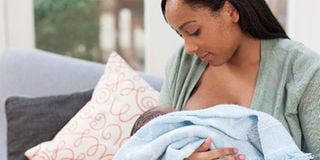Man vs Baby: Whose breast sucking stops cancer?

Scientists have long suspected that breast-feeding might have a protective effect against the blood cancer because breast milk contains many antibodies and immune-strengthening compounds. PHOTO | FILE
Men can help to detect breast cancer by feeling the lumps early enough, so the woman can seek medical help.
Now think of the many strong women who have to live without one or both breasts for the rest of their lives because of cancer. Previous studies have shown that such women worry about their self-image. They also worry that their sexual partners may not love them.
“I know that he cares and that he has helped me through the most difficult time of my life until I am now out of danger,” Joy, a breast cancer survivor, said when I saw her at the Sexology Clinic, “he is human and a man at that and I do not think he views me the same way as he used to.”
Other than the loss of both of her breasts, Joy underwent chemotherapy as well as hormonal treatment. Chemotherapy comes with a set of its own baggage including loss of hair, poor appetite and frequent infections. Weight loss can be massive leaving one emaciated and frail. Joy faced it all and this only served to alter her body image.
Hormonal treatment in breast cancer kills sexual desire. It interferes with normal female hormones and makes one feel menopausal. Similarly, the vagina and the organs around it thin out and become fragile so sex becomes rather painful.
As one goes through treatment, the weakness of the body is accompanied by a heavy emotional burden. Everyone knows that cancer treatment can go either way and so the fear of death can be strong.
“I used to worry a lot about my children,” Joy said, “They are young and unable to take care of themselves and I dreaded the feeling that strangers would be mistreating them; I cried a lot.”
Then there is the financial burden on the family. Cancer treatment is long and expensive. “We depleted our savings and started selling our assets,” Joy said, “at some point, I pleaded with my husband to just let me die so that the assets we had could be directed to the children’s education.”
As Joy came out of the ordeal, she realised that she had not had sex for close to two years. She started wondering how her husband had survived for that long without sex.
“It bothered me that he could have ventured out,” she says, “I had an outburst about it one day but he calmly reassured me that he could never do that to me, not at a time when I was fighting for my life.”
Joy remembers that throughout treatment, no doctor talked to her about sex. Possibly they thought that cancer was so bad a disease that they did not want to divert her attention.
“I however wish that one would be told how the disease and the treatment affect sexuality,” Joy said, “let’s face it, a life that comes with a sexless marriage is not fulfilling even if you have survived cancer.”
As I took Joy and her husband through counselling to restart their sex lives, I realised that the psychological burden of the disease, with all its multi-dimensional damages on individuals and families, lives with one for a while. At some point, Joy started blaming herself for the ordeal she had gone through. She wondered if she could have done anything to prevent the disease.
Well, there is only so much one can do to prevent breast cancer. If you learn to do self-examination as frequently as you can, eat healthily, and do your annual medical check-ups the disease can possibly be detected early and the treatment is easier.
“And people say that suckling of the breast by babies and even by your man could be protective, is this true?” Joy asks.
And yes, breastfeeding is known to provide some level of protection against the disease. Results of a 2007 study found that breastfeeding may offer broad protection against breast cancer that extends to women who delay having children.
“Evidence suggests that women who have children after age 25 can reduce their risk of breast cancer by choosing to breastfeed,” said Dr Giske Ursin, associate professor of preventive medicine at the University of Southern California medical school and the study’s lead author.
While this is proven, I do not have scientific evidence that men sucking on a woman’s breasts is helpful beyond the pleasure it conveys. However, some reports say that a man sucking the breast can help to detect breast cancer by feeling the lumps early enough, so the woman can seek medical help. Women are therefore encouraged to allow their spouses to massage and fondle their breasts to help them detect breast cancer early.





